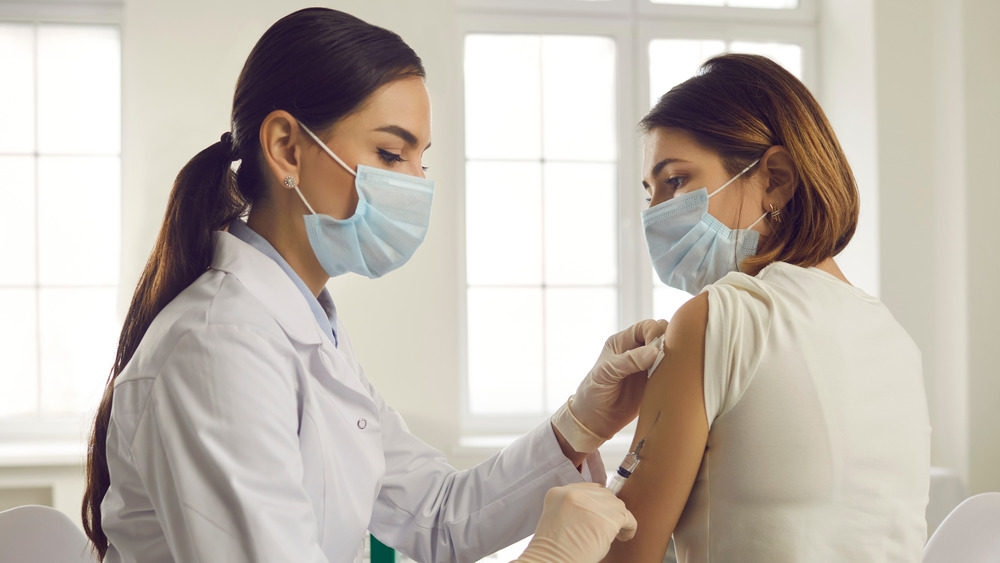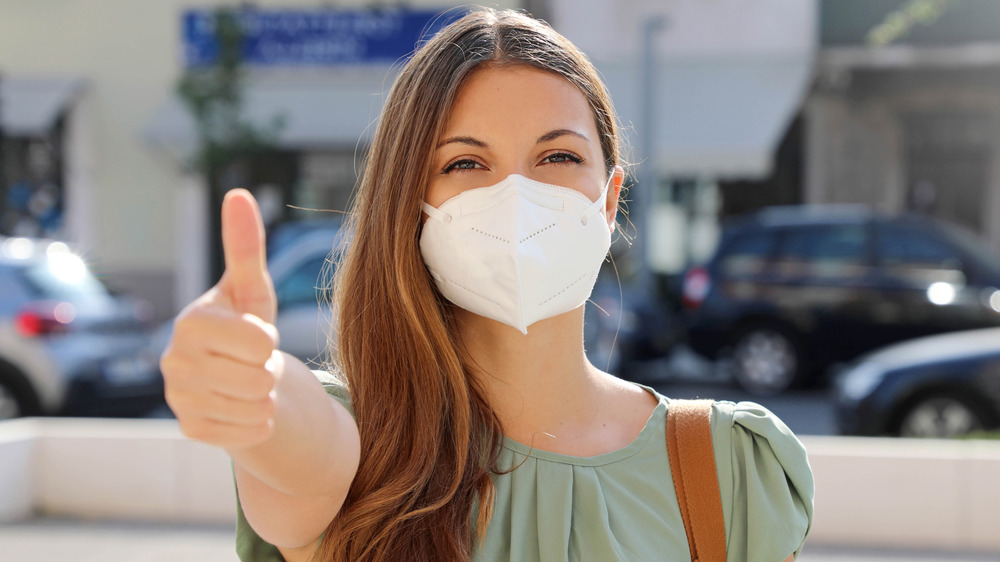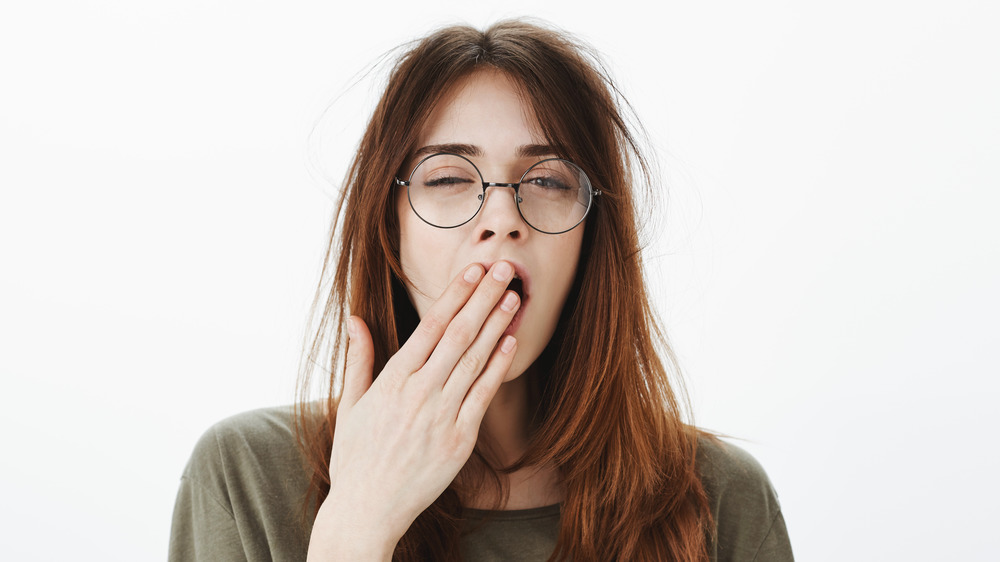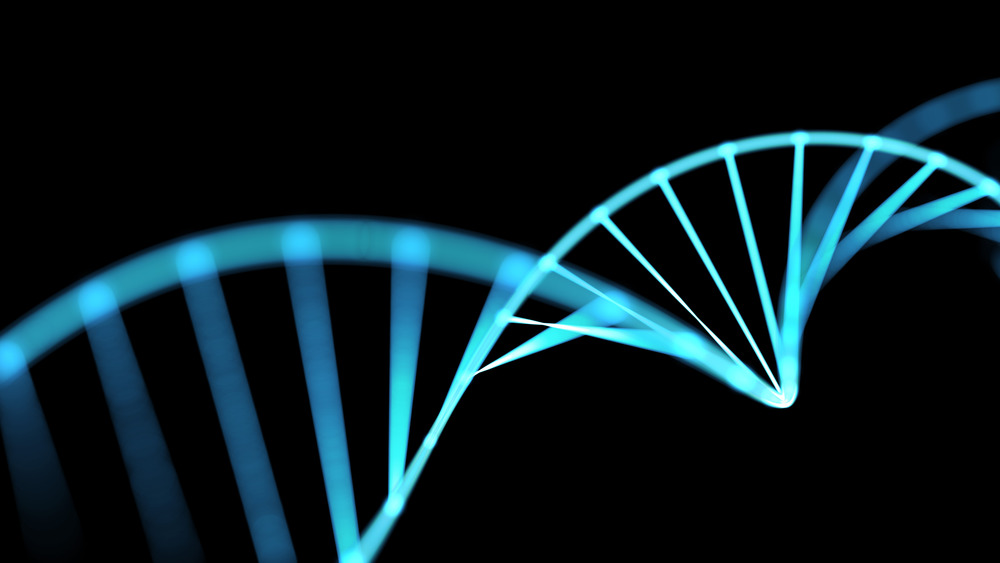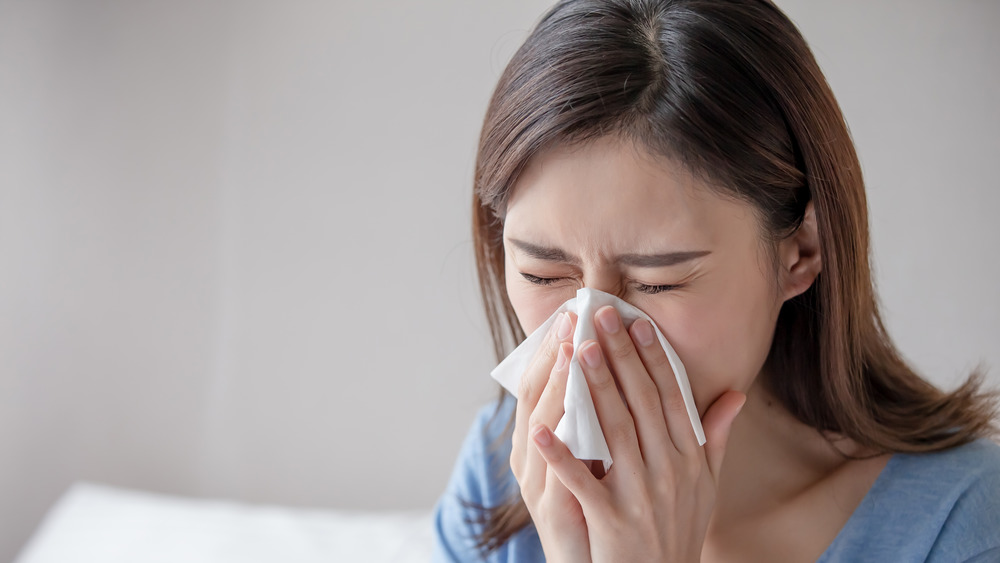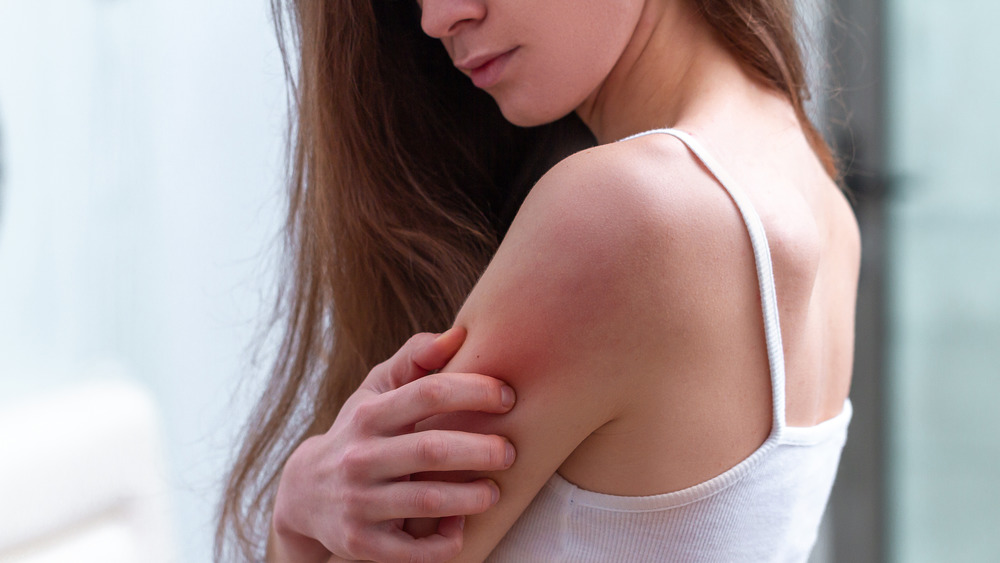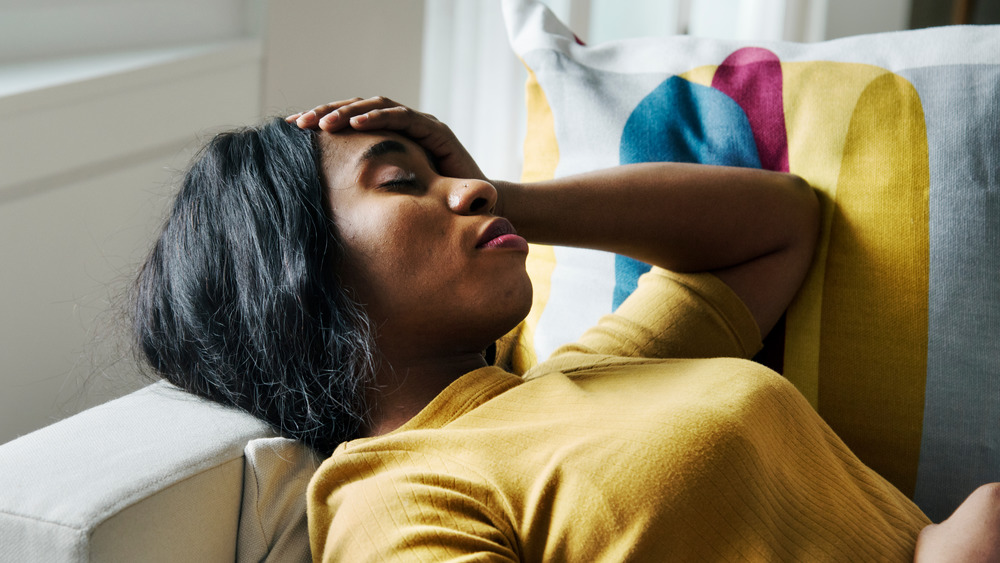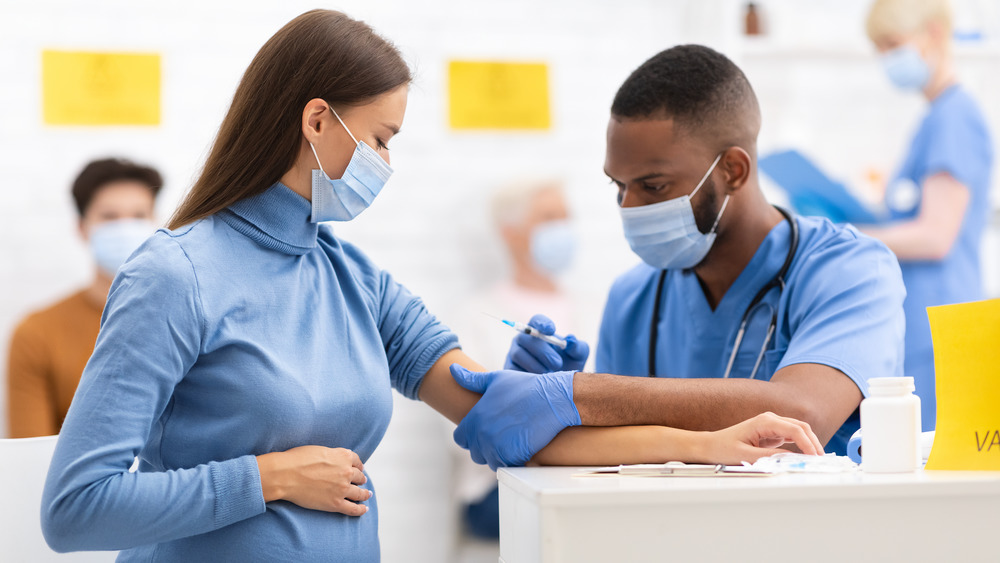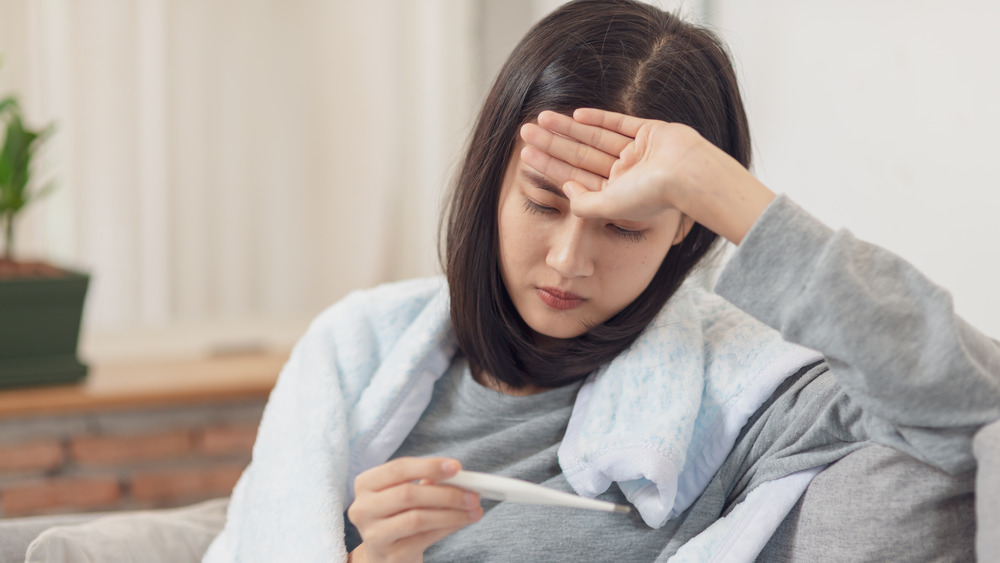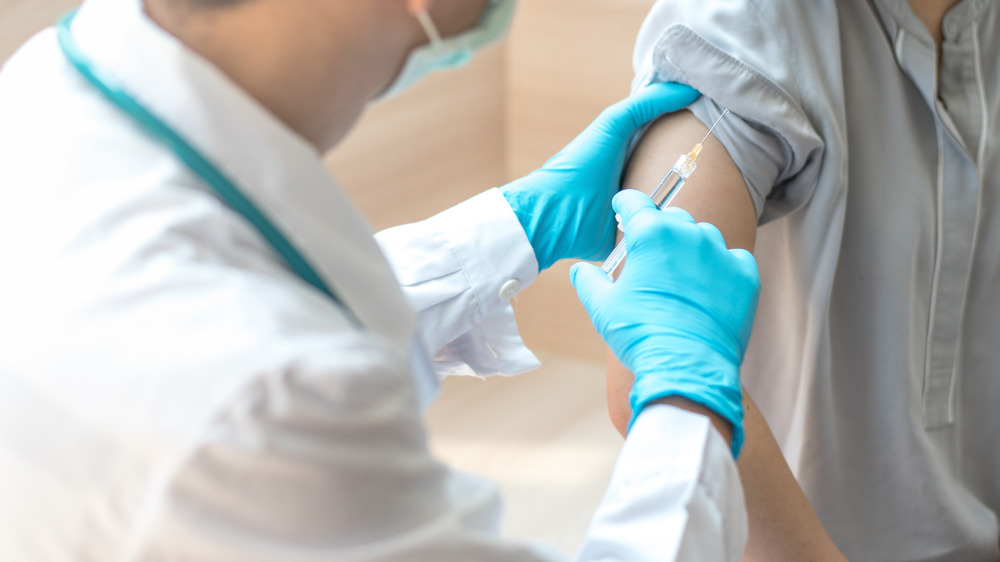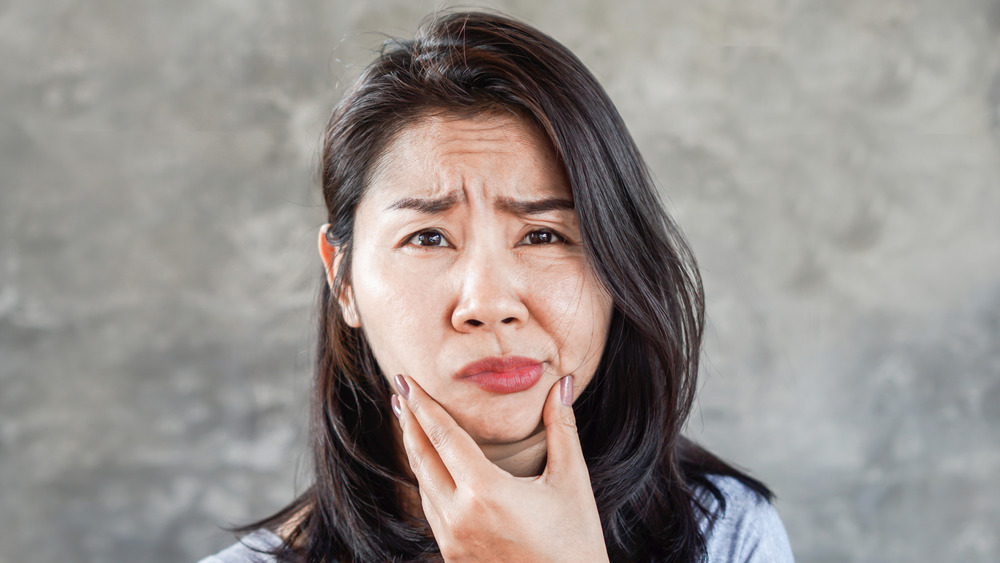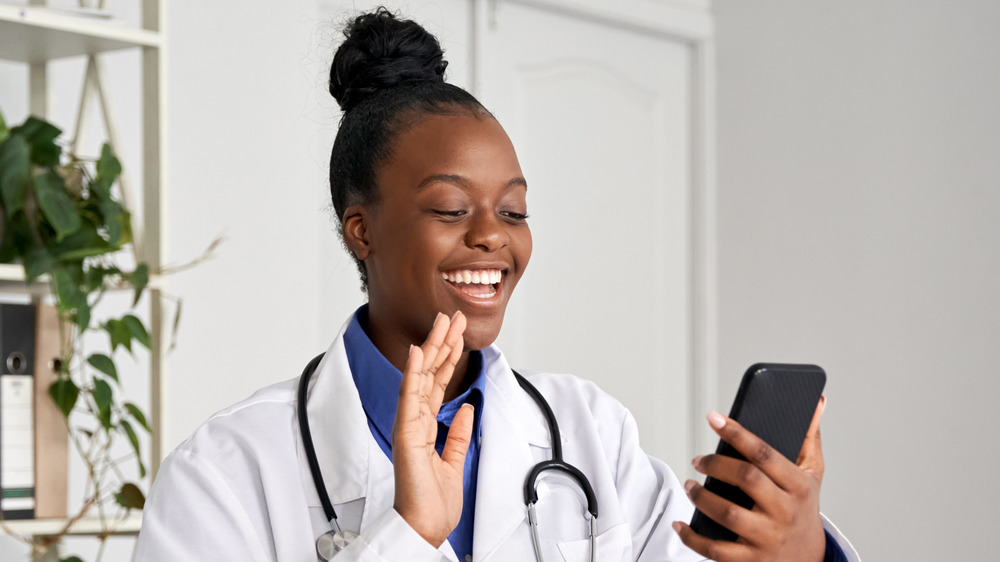When You Get Vaccinated, This Is What Happens To Your Body
When you get vaccinated, what happens to your body? Arguably one of the greatest medical advances in modern history (via Stanford Medicine), vaccination has saved countless lives and prevented the spread of debilitating diseases around the globe, according to the World Health Organization. They also have the power to completely eradicate the ravaging diseases that have killed and sickened people for many years, showing just how powerful vaccines can be. In a nutshell, vaccines are safe and effective, and they keep us healthy and thriving.
While most of us are immunized as children and adolescents, there are still some vaccines you should receive as an adult, such as the seasonal influenza vaccine, the COVID-19 vaccine, and select booster shots, as noted by the CDC. And while no one likes getting injections, they're certainly easier to endure than a bad case of the flu.
So how do vaccines work, anyway? How do they prevent disease and protect our immune systems? And is there any reason to worry when you get these shots? Read on to learn all about what happens to your body when you're vaccinated.
When you get vaccinated, you boost your immunity
The entire reason people get vaccinated in the first place is to protect themselves against the threat of disease. But what specifically is happening to your body in the hours after you get a shot? "Your body is learning how to defend against the dead or partial virus or bacteria that was in the vaccine," Dr. Jenna Liphart Rhoads, a registered nurse, told The List. "So when your body is exposed to the live or fully-functioning microbe in the future, it will know how to kill it and already have a defense in place."
Then, when you're exposed to the disease down the road, your body will be fully prepared to dispose of it, says Rhoads. "When you are then exposed to the microbe, your body can immobilize it before it can replicate in your body and make you contagious OR have symptoms," she continued. She added that it's not unlike getting to know your enemy before you have to fight them, giving you a leg up when the time comes.
You'll also protect those around you after getting vaccinated
Chances are that when you've spoken to your doctor about vaccines, they've likely told you that they're super important in order to stay healthy. But there's actually more to it than that, according to Dr. Jay Woody, CMO of Intuitive Health. "Vaccines don't just protect you," he explained to The List. "They protect everyone around you as well." And that includes all of your loved ones, as well as the people you interact with when you're out in public.
The mechanism at work here is called herd immunity, as noted by the Mayo Clinic. Herd immunity is achieved when enough individuals in a given community are vaccinated against a disease; that decreases transmission of the illness dramatically. That in turn protects not just those who are immune to a disease, but also community members who are especially vulnerable (like the elderly). So if you can't get a vaccine for medical reasons, you'll be protected by the herd, as it were.
You may feel tired after a vaccination
Just as it's important to make sure you get vaccinated against contagious diseases, so too is it important to time your vaccination just right. For one, you want to make sure you've given it enough time to become effective, especially if you're headed to a hotspot. Additionally, if you have big plans, you might not want to get vaccinated right before them. The reason? "As your body is busy building immunity to the bacteria/virus that has been inserted into your body, you may feel a little tired as a side effect," general practitioner Dr. Chun Tang shared with The List. "This is completely normal."
While it is indeed perfectly normal, you don't want to be super exhausted when you're supposed to go on a road trip, or before taking an important test. Rather, get immunized when you'll have time to take it easy, according to Tang. "Try to get an early night and let your body do its work to build the immunity," he added.
No, your DNA will not be altered after getting vaccinated
Since the early 2000s, the anti-vaccination movement in the United States has been on the rise, as noted by The New York Times. But that line of thinking is especially dangerous, says board-certified physician Dr. Abisola Olulade. "You should not hesitate to get a vaccine because vaccine hesitancy is one of the top 10 global health threats, according to the WHO," she told The List. "Vaccines have a long-proven safety track record and disease has a long proven deadly and destructive track record." That's the case with diseases like COVID-19, influenza, and measles, to name just a few.
One of the reasons people refuse to get immunized is because they're afraid of what might be in it, and worry that it will somehow adversely impact their bodies. But that's just not the case, according to Olulade. "It does not alter your DNA," she continued. Nor do vaccines cause autism, SIDS, or any number of conditions that anti-vaxxers have claimed they do — and that's a good thing!
After getting vaccinated, you won't be contagious
It's only natural that people have a lot of questions about vaccines. After all, it can seem counterintuitive to inject yourself with a deadly disease for a variety of reasons, namely that you don't want to get sick. But fear not — not only will you not fall ill, you also won't be contagious after a vaccine, as noted by general practitioner Dr. Chun Tang. "Vaccines are made with weakened or inactive strains of bacteria and viruses, so you are not likely to pass the disease onto someone else after you are vaccinated," he revealed to The List.
That doesn't mean you should go visit your elderly grandparents right after getting vaccinated, or visit someone getting chemotherapy in the hospital, says Tang. "People with severely weakened immune systems could be at risk so it's best to avoid these people after having a live vaccination," he continued. It's better to be safe than sorry, right?
So as long as you don't have immunocompromised folks living in your home, you should be just fine.
You may have redness and tenderness at the vaccination site
Planning on hitting the gym for arm day? Or perhaps you're about to head off on a kayaking or canoeing trip? Make sure you get your vaccination at least a few days before you go, as swelling and inflammation at the injection site is a super common side effect.
But why, exactly, is that the case? What's happening inside your body to trigger such a reaction? "You may have soreness at the injection site because the needle and small amount of liquid is displacing muscle tissue (moving it aside), which can cause tenderness and bruising," Dr. Jenna Liphart Rhoads, a registered nurse, explained to The List. "Our bodies also do not like foreign substances and inflammation (a normal process) can occur when a foreign substance is introduced into the tissues." And that can definitely put a damper on your rowing plans.
That doesn't mean you're definitely going to have a sore arm after getting immunized, as some folks might have no swelling at all. But since it's possible, it can't hurt to plan around it.
You may develop a headache after getting vaccinated
According to the CDC, another common side effect from vaccination is developing a headache. That's especially likely after receiving the shot for HPV, influenza, meningococcal B, and Td, to name just a few.
Additionally, as reported by Wired, more than half of the individuals who participated in the COVID-19 vaccine trial for Pfizer said that they got a headache. But that's no reason to skip out on the vaccine, says Dr. Melanie Swift, an occupational medicine doctor who helped to orchestrate the COVID-19 vaccination plan at the Mayo Clinic. "Just because you're sore doesn't mean that (the vaccine) didn't work or wasn't effective," she shared in an interview with USA Today. "It just means that your body responded the way it's supposed to." She added that if you don't follow through with the second shot, the first dose will have been in vain.
Fortunately, the headache will eventually go away, so any discomfort is temporary. For the curious, here are the potential side effects of the COVID-19 vaccine.
After getting vaccinated, you may have these side effects
While the benefits of vaccination far outweigh any possible negatives, unfortunately there are some rather unpleasant side effects that can happen. In addition to a sore arm and a possible headache, Dr. Jenna Liphart Rhoads, a registered nurse, says there are other possible things that can occur post-vaccine. "You may experience side effects like lethargy and fatigue, chills and fever, stomachache, or stiffness at the injection site," she told The List.
However, if you find yourself contending with one more of these conditions, don't freak out. "This is completely normal and a GOOD thing because it means your immune system is working to learn about the microbe and protect you," Rhoads continued. If anything, these side effects show you just a fraction of what the actual disease has the capacity to do; remember that when you're struggling with any of these, as it could be so much worse.
That said, if you find yourself having a severe reaction after getting an immunization, consult your healthcare professional.
Why do you feel ill after getting vaccinated?
One of the most common misconceptions about vaccines is that they can make you sick in and of themselves. And while it's not a totally illogical conclusion to come to, it's factually untrue, as noted by the CDC. So no, getting the flu shot won't give you the flu.
So why on earth do some people feel sick after they receive a vaccination? As it turns out, it depends on what other germs you've been exposed to, says general practitioner Dr. Chun Tang. "As your body is building immunity to the bacteria introduced by the vaccination, if you are infected with another virus or bacteria, your body may be slow to fight off both," he explained to The List.
To that end, make sure you answer all of the questions honestly before getting immunized, as your doctor needs to know the status of your health, as noted by Tang. "This is why it is important to ensure you are fit and healthy before having a vaccination," he continued.
If you get vaccinated, you'll likely live longer
You'd be pretty hard-pressed to find someone who says they don't want to live a long, happy, and healthy life. After all, doesn't the idea of jet-setting around the world in retirement sound pretty great?
One way you can ensure that you get the best shot at that is to keep up with your vaccinations, according to general practitioner Dr. Chun Tang. "Building immunity against disease is critical to ensuring you live longer," the general practitioner revealed to The List. "In 1900, life expectancy in the United States was 47.3 years. Today's life expectancy is 78.7 years, thanks to the eradication/reduction of diseases such as pneumonia, influenza, tuberculosis, diphtheria, smallpox, pertussis, measles, and typhoid fever."
While there have certainly been a lot of technological and medical advances since the days of widespread tuberculosis outbreaks, at the end of the day, there's one practice in particular that's given us longer life spans, says Tang. "We have the availability of vaccinations to thank," he added.
Don't get vaccinated if you have these allergies
While most people should get vaccinated against infectious diseases, there are some folks who should opt out of immunization, as noted by Dr. Jay Woody, CMO of Intuitive Health. "Some patients have a reaction to the components in the vaccine," he shared with The List. "Patients who are sensitive or allergic to gelatin or egg protein are often advised not to get the flu shot since the vaccine is mostly grown in chicken eggs." That's just another reason that herd immunity is so important!
When it comes to the COVID-19 vaccine in particular, two recipients had an allergic reaction when the Pfizer vaccine was first rolled out at the end of 2020, according to The New York Times. The first, a middle-aged woman who wasn't aware of any allergies she may have, went into anaphylactic shock about 10 minutes after the injection. Fortunately, she was treated with epinephrine and steroids, and was released a few days later. The second had a less severe reaction, and was treated and released within the hour.
To that end, if you know you have vaccine-related allergies, talk to your doctor about your options. Additionally, here's what you should know about the COVID-19 vaccine if you have allergies.
You might feel relieved after getting vaccinated
On Monday, Dec. 14, 2020, Sandra Lindsay, the director of critical care nursing at the Long Island Jewish Medical Center, made history when she was the first person the receive the COVID-19 vaccine. Naturally, it was an emotional moment for her. "It feels surreal," she confessed in an interview with The New York Times. "It is a huge sense of relief for me, and hope." Given all that healthcare workers in New York went through in 2020, it's a completely understandable reaction.
While Lindsay has been fighting on the front lines of the COVID-19 pandemic, you don't have to be a healthcare hero to feel relieved at the prospect of getting vaccinated. Given that so many of us struggled with our mental health during the pandemic (via the CDC), the idea that it won't last forever is a balm for weary souls. So don't be surprised if you feel a profound sense of relief after your next vaccination; that's the herald of everything returning to normal. Oh, and it means you won't get sick, too!
Can you get facial paralysis after getting vaccinated?
Once it became abundantly clear that the world needed a vaccination for COVID-19, vaccine makers kicked into high gear, which included conducting vaccine trials. After that, it didn't take long for people to start posting about their skepticism concerning the vaccine on social media. In particular, one Facebook user insinuated that the COVID-19 vaccine could cause Bell's palsy, a condition in which part of the face is paralyzed.
However, despite the fact that four people did develop the condition after receiving the Pfizer immunization, it's likely the vaccine wasn't the culprit. According to USA Today, each person who wound up with Bell's palsy did so at nine, 37, and 48 days after inoculation, with the duration being 10, 15 and 21 days, respectively. Additionally, given that 15 to 23 out of 100,000 people are diagnosed with Bell's palsy every year, it's likely the shot had nothing to do with it.
Talk to your doctor before getting vaccinated
It's overwhelmingly clear that vaccines on the whole are safe and effective, and have saved millions of lives over the years (via the World Health Organization). To that end, it's truly incredible that modern science has come up with a way to keep so many of us safe and thriving.
That being said, the most important thing you can do for your health and that of your family is talk to your doctor about vaccines, COVID-19 or otherwise. They're truly the expert on your wellness and will know what's right for you when it comes to immunization. The CDC also has a host of resources available for the curious, which is useful for anyone advocating for their own health.
At the end of the day, it's up to you to look out for yourself as best as you can, so if you have health insurance, do yourself a favor and use it.
